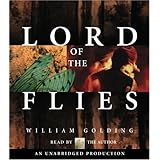Golding, William. Lord of the Flies. Read by William Golding. Penguin Random House Audio Publishing Group, 2003. Audiobook.
image from: www.amazon.com

Plot Summary
British schoolboys are stranded on a tropical island. In an attempt to recreate the culture they left behind, they elect Ralph to lead, with the intellectual Piggy as counselor. But Jack wants to lead, too, and one-by-one, he lures the boys from civility and reason to the savage survivalism of primeval hunters. In Lord of the Flies, William Golding gives us a glimpse of the savagery that underlies even the most civilized human beings.
The three most important aspects of Lord of the Flies:
- The major theme of Lord of the Flies is that humans are essentially barbaric if not downright evil. The stranded boys begin by establishing a society similar to the one they left behind in England, but soon their society has degenerated into rival clans ruled by fear and violence; before the book is over, three boys have been killed.
- The novel is an allegory, which is a story in which characters, settings, and events stand for things larger than themselves. For example, the island represents the world; Ralph and Jack symbolize different approaches to leadership.
- William Golding wrote Lord of the Flies following World War II, during which the Nazis exterminated six million Jews and the United States dropped two atomic bombs on Japan. In this context, the novel's profound pessimism is understandable.
I've heard about this book for years, as my Senior English teacher friends teach this book. It is one I've never stopped to read, so when it was available as a free audiobook, I was excited to get it.
I listened to this book on the way home from South Dakota this summer. The narrator's voice was the author! I thought that was neat. His pauses, pronounciations and inflections are still in my head. I remember driving through Kansas imagining the island the boys lived on in this book.
Piggy was the voice of rational thoughts. He tried to keep the island calm, but he was pushed aside by Jack's quest for leadership and power. It made me sad to hear what happened to him.
Ralph was also a character I came to care about in this story. He was trying to do the "right thing" and when the boys are finally found, he cries. I almost cried, too. It was a very moving scene.
As I was driving (and it's been a few months since listening), I can't remember what else happened. I remember a waterfall and again, just listening to the author's voice read the story. This will probably be a story I actually pick up the book to read to help me remember more.
No comments:
Post a Comment